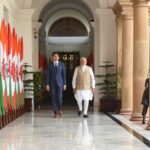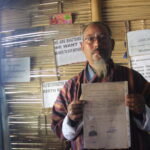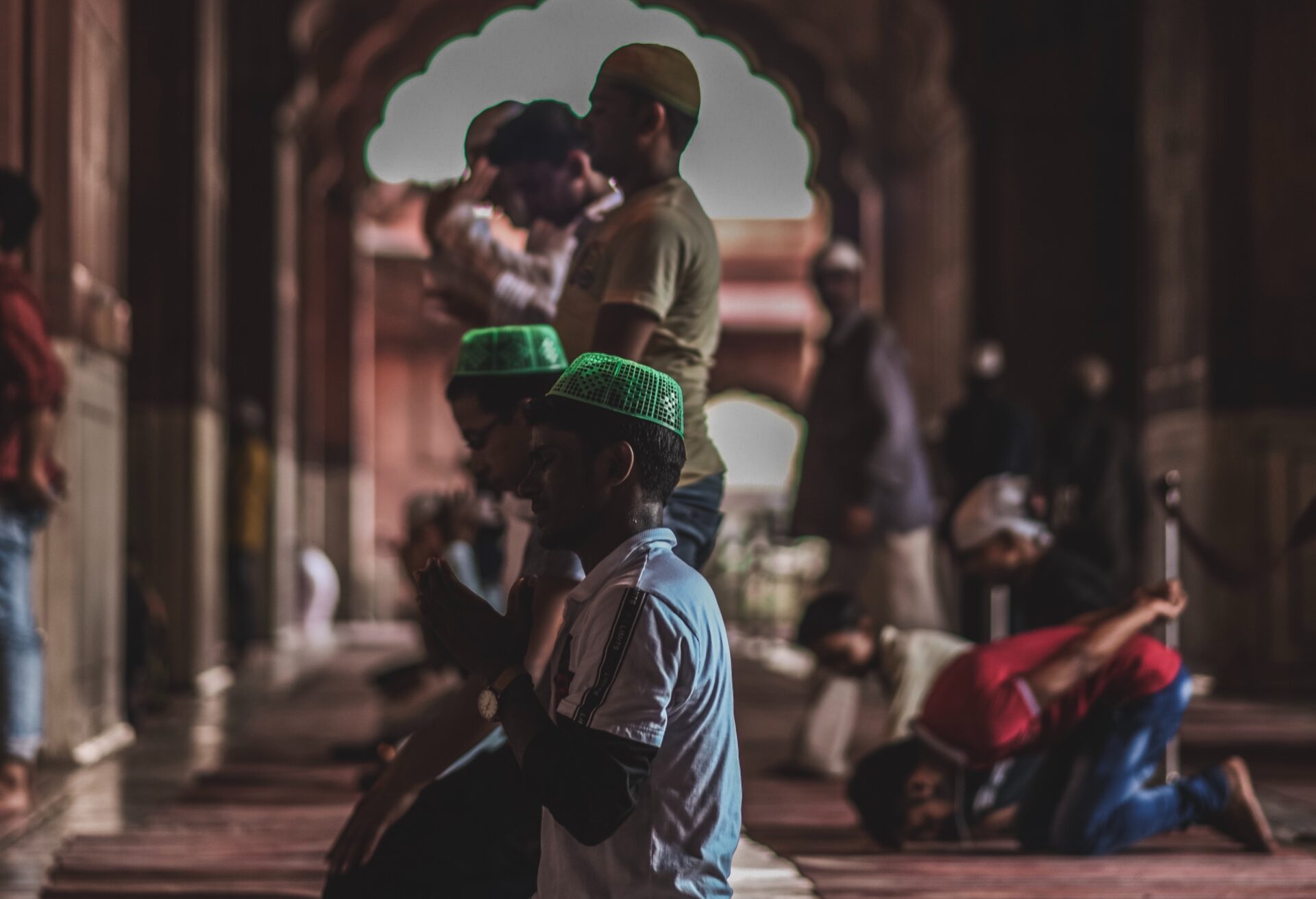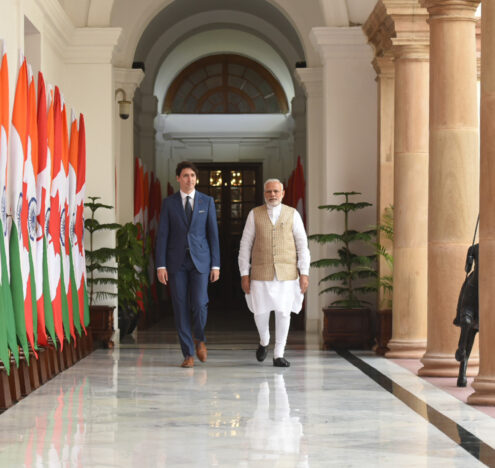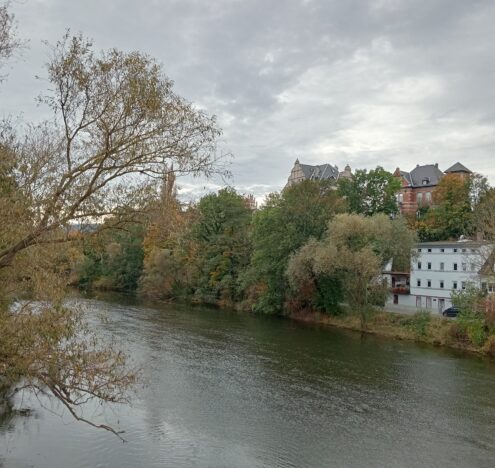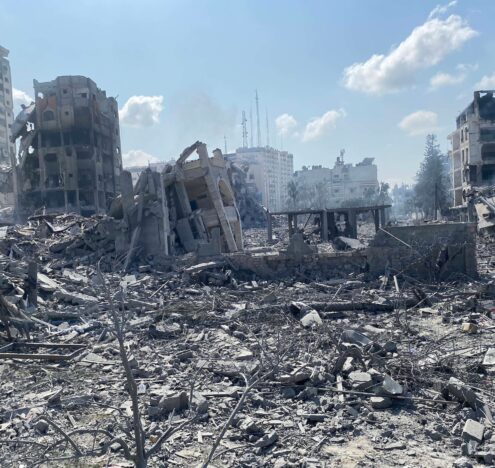Hours after the Hamas attack on Israeli territory on Oct. 7, 2023, India’s ruling Hindu nationalist Bharatiya Janata Party (BJP) posted on its official X (formerly Twitter) account: “What Israel is facing today, India suffered between 2004-14. Never forgive, never forget…” with a video that juxtaposed visuals of terror attacks in India with footage of Palestinian fighters. The video, shared by Prime Minister Narendra Modi’s party, was widely seen as a “dog whistle” and the insinuation of a larger Islamophobic campaign couched within anti-Palestine disinformation.
Shortly after the video was posted, right-wing groups and social media accounts in the country used the Israel-Hamas war to stoke Islamophobia. The posts included the assertion of numerous “Gazas” in India and the proclamation that only Modi possessed the capability to safeguard Indian Hindus from a hypothetical Hamas-style attack.
“Israel is in danger from traitors sitting outside the country, and India is in danger from traitors sitting inside the country. Hence the danger for us is more,” posted Ashwini Upadhiya, a Delhi-based Hindutva leader and Supreme Court lawyer with over half a million followers on X.
He urged Modi and his Home Minister Amit Shah to use the country’s terror laws, such as the National Security Act of 1980, The Unlawful Activities (Prevention) Act of 1967, and The Uttar Pradesh Gangsters and Anti-Social Activities (Prevention) Act, 1986.
Disinformation in India
The disinformation was “on expected lines,” according to award-winning Indian fact-checker Mohammed Zubair, who told Inkstick he was “shocked” by the scale of anti-Palestinian disinformation and the “amount of hatred” that is being directed at Indian Muslims in view of the conflict.
“It has anything and everything to do with demonizing [Indian] Muslims,” claims the co-founder of Alt News, a leading fact-checking portal in India. “To target Muslims [in India], they accuse all people supporting Palestine as being supporters of Hamas and label them as terrorists.”
Repeating similar trends from 2021, hashtags such as #ISupportIsrael, and #IndiaWithIsrael, have resurfaced on Indian social media over the past few weeks. Right-wing accounts have also used #PalestineTerrorists in their posts.
One account, Mr Sinha_, followed by India’s ministers among other leaders of the BJP, shared multiple false videos misrepresenting Palestinians. In one post, the account said the body of a child killed in Gaza was an “injured doll.” Zubair debunked the allegation, but the post was never taken down, and garnered over 887,000 views.
Aditya Raj Kaul, Executive Editor of TV9 Network, tweeted that a pregnant woman was mutilated by Hamas, killing the unborn child. The post has been viewed 10.3 million times despite no evidence to back his claims.
Kaul is joined by Indian channels that have displayed support for Israel’s bombing of Gaza. While India has not designated Hamas as a terrorist group, a majority of channels have labeled it so.
“They are using the issue for their own Islamophobic content,” said Aishe Ghosh, the president of Jawaharlal Nehru University Student’s Union, told Inkstick. The student leader said even “liberal” media has joined in “dehumanizing Palestinians.”
“Communalizing everything, especially making it anti-Muslim, has become a culture of this country. They don’t speak about Palestine and the genocide happening.”
Ghosh was “manhandled” and briefly detained by Indian Police for protesting against Israel’s war crimes in New Delhi. She claims India has not been tolerant of the issue, citing cases in Indian cities against pro-Palestine actions.
Cheering for “Muslim Genocide”
Zubair expressed his anguish at seeing people mocking the death of children “even after they know these were 100% real.” About 3,000 children are among over 7,000 Palestinians killed in Gaza due to Israel’s military air strike since Oct. 7, 2023.
He estimates that “If you look at any pro-Israel account on social media, over 70% of the comments are from India.”
“Communalizing everything, especially making it anti-Muslim, has become a culture of this country. They don’t speak about Palestine and the genocide happening.”
Aishe Goshe
Many in the country believe Hindutva groups that have expressed support for Israeli actions in Gaza seek greater suffering for Muslims, whom they consider a threat to Hindu civilization. “They want to do the same to Indian Muslims when the time comes,” said Sharjeel Usmani to Inkstick, a Muslim student activist.
“Hindutva leaders such as Yati Narsinghanand have been calling for a Rohingya-like solution for Muslims in India. What’s happening in Gaza is but a manifestation of their plan for ethnic cleansing, and they fantasize about participating in it.”
Last week, Narsinghanand, a militant Hindu priest, released a video in which he said Hindus and Jews “have the same enemy: Muhammad and his satanic book” and urged the Israeli government to allow 1,000 Hindus to settle in Israel in order to take on Muslims.
“Anecdotally, from my experience, this is a relatively new thing: The most bloodthirsty, genocidal comments in the wake of Hamas’s awful rampage that I’m seeing here are all coming from right-wing, pro-BJP Indians,” Ishaan Tharoor, a Global Affairs Columnist at The Washington Post, wrote on X.
India Becoming “Soft” Israel
The global spotlight on India for anti-Palestine vilification by the right wing has overshadowed India’s long-standing “de-hyphenated approach” to the Israel and Palestine issue.
In the wake of the Hamas attack on Oct. 7, 2023, Modi issued strong declarations in support of Israel. It took five days for the Ministry of External Affairs to issue a statement reiterating New Delhi’s position of establishing a “sovereign, independent, and viable state of Palestine, living within secure and recognized borders, side by side at peace with Israel.”
But Modi remained largely silent about the relentless bombing and complete siege of the Gaza Strip until the Al-Ahli hospital bombing. On Oct. 19, 2023, Modi spoke with the President of the Palestinian Authority Mahmoud Abbas and conveyed his condolences on the loss of civilian lives at the hospital. Although he “reiterated India’s long-standing principled position on the Israel-Palestine issue,” he stopped short of calling for a ceasefire.
India was the first non-Arab country to recognize the Palestine Liberation Organization (PLO) and also issued a commemorative postage stamp on Nov. 29, 1981, to mark the international day of solidarity with the Palestinian people. But the country has been drifting closer to Israel since Modi came into power in 2014. India is the biggest buyer of weapons from Israel and shares arms technology, among other bilateral cooperation. In 2017, Modi became the first Indian prime minister to visit Israel. He calls his Israeli counterpart Benjamin Netanyahu a “friend.”
“India wants to be a kind of version of Israel,” says Azad Essa, author of the book “Hostile Homelands: The New Alliance Between India and Israel,” told Inkstick.
“It follows the Israeli model when it comes to governing Kashmiris,” Essa said, referring to India’s attempt to replicate Israeli-style settler colonialism in the disputed Muslim-majority Kashmir valley. “It’s following the Israeli model when it comes to dealing with dissent in India itself.”
“Modi looks at Netanyahu as a leader who is muscular, who is unashamed with ethno nationalists and sort of religious nationalists. And India wants to become that type of country. So by supporting Israel, it’s actually protecting itself in a way.”
The senior journalist observes that the “de-hyphenated” policy of India is “politically empty.”
“India is actually subsidizing the Israeli occupation. So, on one hand, they talk about being a kind of neutral partner. But there’s no actual movement towards trying to build a case for Palestinian self-determination,” Essa added.




